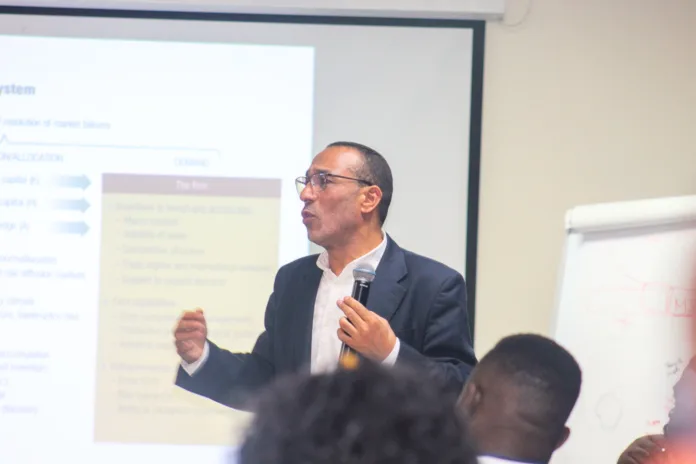
The International Labour Organisation (ILO) and the Ghana Statistical Service (GSS) have successfully concluded a two-day stakeholder discussion on developing a national labour and multi-factor productivity measurement.
When completed, the document will have many benefits, including improved evidence-based decision-making in the labour market and industrial sectors, increased transparency and accountability in wage determination, and a stronger foundation for economic growth and development. This initiative is under the Productivity Ecosystems for Decent Work project.
The meeting held on July 17-18, 2023, brought together representatives from the Trades Union Congress, Ministry of Employment and Labour Relations, Embassy of Norway, Fair Wages and Salaries Commission, UNFPA, Management Development and Productivity Institute, the University of Ghana, University of Professional Studies, University of Cape Coast, Institute of Statistical Social and Economic Research, University for Development Studies, other relevant development and social partners to contribute to how the dataset will be computed.
David Marcos the project manager for Productivity Ecosystems for Decent Work delivering a message on behalf of Vanessa Lerato PHALA, Director ILO Country Office for Nigeria, Ghana, Liberia, and Sierra Leone, said, “For the workers and unions, sometimes wage negotiations can get a bit tense,” making the availability of credible data to make these negotiations crucial. He said this research is essential to form the benchmark to measure Ghana’s productivity performance and to know the impact of the Productivity Ecosystems for Decent Work project.
Fred Pappoe, a representative from the Embassy Norway said “For us at Norway and I believe I can also speak for SECO–that’s the Swiss Embassy who are also co-sponsors of the programme. It gives us a very good sight to behold the level of discussions.”
He said the nature of the PE4DW project s multi-institutional “and just looking around the table here we have quite a lot of key institutions represented and participating very actively.”
Labour economist from the University of Ghana, Dr. Priscilla Twumasi Baffour, presented the policy scan on productivity and decent work in Ghana. She identified decent work as one requisite to mitigate the adverse effects of globalisation.
In her presentation, she also highlighted some key factors accounting for the deficits in productivity in Ghana’s economy. She said, “There is the overall lack of a long-term plan working toward increasing productivity in the country. The average Ghanaian spends a lot of time in traffic which affects productivity, poor work environment, inadequate resources, and overall lack of commitment by workers due to low remuneration on the job.”
She concluded that productivity improvement in Ghana has been a challenge at all levels of the economy despite various policies implemented over the years. She identified the lack of funding, over-dependence on external financing, and political interference as some of the setbacks to productivity growth that justify the PE4DW project.
In his presentation on productivity statistics computation, Professor Ezzahid Elhadj, a consultant from University Mohammed V, Rabat, Morocco, explained multi-factor productivity as the point of differentiation between a country with a GDP of $100 billion and another with a GDP of $50 billion with the same capital and labour output.
He further explained that multi-factor productivity measures “The efficiency with which the economy works. Because we can say that the economy’s growth may depend on the accumulation of labor and capital, but it may depend on productivity–meaning how efficiently you use the inputs.”
The Director of Economics at the Ghana Statistical Service Edward Asuo Afram declared the Service’s support to the committees by providing all data needed for the computation of the labour and multi-factor productivity measurement. He said Ghana has the potential to revive its Gross Domestic Product (GDP) growth again when everyone works to ensure this project is successful.
About the Productivity Ecosystems for Decent Work Programme
The Productivity Ecosystems for Decent Work Programme addresses constraints to productivity growth and decent work at the policy, sector, and enterprise level. It supports the structural transformation of economies and labour markets towards more and better jobs, higher productivity, and equitable distribution of productivity gains via social dialogue. Supported by Governments, employers’ and workers’ organizations during the ILO Governing Body discussions in November 2022, it is being piloted in South Africa, Ghana, and Viet Nam from 2022 to 2025 with US$ 9.2 Million from SECO and US$ 7.2 Million from the Norwegian Agency for Development Cooperation (NORAD).
Source: Ghana/Starrfm.com.gh/103.5FM



